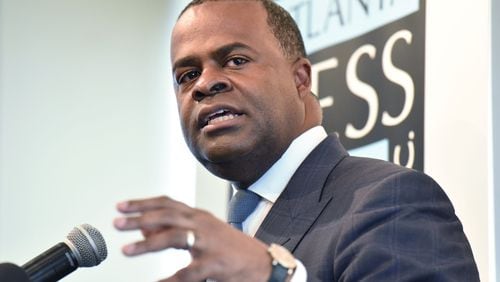Atlanta Mayor Kasim Reed is drawing fire from multiple sides in the hot-button debate over illegal immigration after recently announcing the city had joined a nationwide effort in finding legal help for immigrants facing deportation.
When Reed announced the city’s new policy this month, he called Atlanta a “welcoming city that stands up for the civil and human rights of every person.” That comment struck one of his critics as hypocritical, given that the Atlanta City Detention Center is holding 264 immigrants facing removal from the U.S. The city is paid $78 a day per each U.S. Immigration and Customs Enforcement detainee held in the jail, according to documents obtained by The Atlanta Journal-Constitution. So far this fiscal year, the federal government has paid Atlanta $2.8 million through that arrangement.
“It is hypocritical for the leadership to declare Atlanta a welcoming city for immigrants and at the same time continue to let the city profit off the detention of immigrants for ICE,” said Azadeh Shahshahani, the legal and advocacy director for Project South, which advocates for immigrants with and without legal status. “The city needs to immediately stop imprisoning immigrants for ICE. Otherwise, their rhetoric rings hollow.”
Meanwhile, Jim Jess, the vice chairman of the Georgia Tea Party Inc., is concerned the legal aid program won’t uphold the rule of law, particularly if city taxpayers are required to pay the legal bills for immigrants living in the country without authorization.
“If I were a voter in the city of Atlanta, I would be upset with this policy and I would be talking to my public officials about it,” said Jess, a north Cobb County resident.
Jenna Garland, a spokeswoman for the mayor, pointed out the city’s contract with ICE for holding its detainees predates Reed’s administration, which began in 2010. The AJC found one version dating to 2002. Garland also underscored that ICE decides which of its detainees to send to the city jail, not Atlanta officials, who aren’t authorized to enforce federal immigration laws. Further, Patrick Labat, who oversees the jail, has received national recognition for its “exemplary operation,” Garland said. And an American Correctional Association reaccreditation audit has found the jail to be 100 percent compliant, she said.
“By housing immigration detainees at the Atlanta City Detention Center, we can guarantee these immigrants receive far superior treatment than at other facilities, including access to health care, access to their family members and a network of resources found in our city and the metropolitan area,” Garland said. “The ACDC is highly accessible by mass transit, and as a result, the families of detained immigrants find it much easier to visit the ACDC compared to other facilities.
“Detention facilities located in more rural areas do not have the same ease of access and concentration of resources through family networks, faith-based organizations and other nonprofit and civic organizations,” she continued. “This is an extremely important consideration for immigrants and foreign-born individuals.”
The jail’s agreement with ICE attracted new scrutiny this month after Reed announced on Nov. 9 that Atlanta had joined the Vera Institute of Justice’s Safety and Fairness for Everyone Cities Network, which provides publicly funded legal representation for immigrants facing deportation. Ten other cities and counties have joined the network. It will operate in Atlanta with a mixture of Vera grants and funding from the city, according to Reed’s office.
Supporters say the program could help indigent people succeed in federal immigration court proceedings, allowing them to stay with their families and keep their jobs in the U.S. They also say the program could help maintain trust between immigrants and government authorities.
“Time and time again, Atlantans have rallied in support of our immigrant and foreign-born communities. This support is needed now more than ever,” Reed said as part of his announcement. “Atlanta is proud to be a welcoming city that stands up for the civil and human rights of every person.”
Reed has also forcefully spoken out against President Donald Trump’s immigration policies, including Trump’s decision to cancel an Obama-era program that is shielding young immigrants from deportation. Additionally, the mayor has vowed Atlanta will forcefully prosecute any hate crimes targeting immigrants.
“We believe our actions are consistent with our values,” Garland said. “Atlanta is a welcoming city that stands up for the civil and human rights of every person. Housing federal detainees in a safe, centrally located and accessible facility is a demonstration of our commitment.”
In May, Project South joined a group of other advocacy organizations in calling on Reed to shut down the city jail, citing the death of one of its ICE detainees. Atulkumar Babubhai Patel, a 58-year-old Indian national who was being held at the jail, died from natural causes that month at Grady Memorial Hospital. The official cause of death was congestive heart failure due to atherosclerotic coronary artery disease, according to a Fulton County Medical Examiner Office report. Patel also suffered from diabetes.
RELATED: Autopsy report: ICE detainee died from natural causes in Atlanta.
Patel arrived at Hartsfield-Jackson International Airport on May 10 aboard a flight from Quito, Ecuador. He did not have the required immigration documents, according to ICE, so he was placed in the federal agency’s custody at the city jail. He received a medical screening there and was found to have high blood pressure and diabetes, according to ICE. Three days after he arrived in the U.S., a nurse checking his blood sugar noticed he was short of breath, so he was transported to Grady, where he later died.
In fiscal 2016, nine of ICE’s 352,000 detainees died while in the agency’s custody, according to ICE.
“U.S. Immigration and Customs Enforcement is firmly committed to the safety and welfare of all those in its custody,” ICE spokesman Bryan Cox said. “All ICE facilities are subject to regular inspections, both announced and unannounced, and the Atlanta City Detention Center has repeatedly been found to operate in compliance with ICE’s rigorous National Detention Standards.”
About the Author








